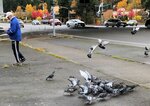

Driving by the intersection at Black Lake Boulevard and Highway 101 on any day between 9 and 10 a.m. in any season, rain or shine, hot or cold, you’ll very likely see a distinguished-looking, slightly elderly gentleman tossing handfuls of bird seed to a large flock of pigeons eagerly awaiting a morning meal.
Through a changing landscape, as new stores replaced old, buildings were demolished, traffic increased, even rebuilding the 101 overpass, that familiar ritual has persisted for more than 33 years, and more than 10,000 trips.
Undeterred by time or weather, by construction or traffic, and the demands of modern life, retired emergency room surgeon Dr. Robert Taylor makes the mile round trip walk to the 101 overpass roughly 330 mornings each year to distribute about 2 pounds of bird seed to a receptive crowd. The stuff of urban legend?
Of such extraordinary devotion, especially to a species often considered an urban nuisance, Dr. Taylor had this to say:
“It was around 1990 that I became involved with the residents of the Black Lake Blvd and 101 exit intersection. I was involved in long-distance running and often ran over to Cooper Point, passing under the 101 overpass. That is how I became acquainted with the pigeons, crows, seagulls and homeless people who frequented that area. I treated several pigeons and some homeless who were sick or injured. I discovered there were fewer sick pigeons if they had adequate nutrition, so I started feeding them Pigeon Mix B I found at the old Mud Bay store. When they stopped handling the mix, I switched to oiled sunflower seeds, which the birds seemed to like just as well. At the beginning, the pigeons lived under the overpass and had their families there. This created a lot of guano which I cleaned up a couple times per month. The city decided the pigeons and their poop was a nuisance, so they put up barriers that caused the pigeons to move their families to other surroundings. They might have moved their residences away but still came back every day to feed. I have seen many various pigeons as well as many homeless people come and go. Initially, there were about twenty pigeons and three homeless regulars named Mike, Eugene and Dan. Eugene ended up mentally disabled, Mike died young from his alcoholism and Dan is being treated for cancer. Many of the regular pigeons I recognized initially have left the flock as well, but just like the homeless, new pigeons have been showing up regularly. It may seem that the pigeons are benefitting from being fed and the homeless’ situation is temporarily improved by the small amount of money I give them daily. The real benefit is mine. Pigeons are beautiful, athletic birds with incredible flying capabilities, various plumage colors and if you’re lucky enough to have one land on your hand, you’ll be having a great day. Also, if you talk with a homeless person, you might just be surprised by the stories they can regale you with.”
“The pigeon that I found too sick to fly, so I brought home and treated him until he was well was Walter. He is the one who used to follow me when I ran and lost his tail when he was hit by a car on our way home one day. A second pigeon who spent time at our home was Priscilla, who I brought home and treated her for a broken wing. Several pigeons have died in my care and that was always sad, but I have always felt okay with that as long as they died with someone who cared and they didn't have to be scared. What more can you ask for."
When asked how long he will continue, Dr. Taylor replied: "For as long as I can."
In the distant future, should the good Doctor decide to retire, candidates wishing to continue his noble tradition should consider these painless requirements, daily trips, preferably between 9 and 10 a.m., to and from the Highway 101 intersection for roughly 11 months out of the year at a cost of about $1.75 per day and a keen eye for pigeons in distress that may need in-home rehabilitation. No sick days or vacations without prior pigeon notification and approval. Interviews conducted by Walter, Priscilla and their descendants.
Long, long ago, the Greek Physician Hippocrates observed, " The soul is the same in all living creatures, although the body of each is different."
After more than three decades of dedication to these small souls with wings, it is apparent that Dr. Taylor is of similar mind.
Written by Frederick (Rick) Stence, of West Olympia.
3 comments on this item Please log in to comment by clicking here
Johnwils
Thanks for sharing an inspirational story!
Thursday, September 7, 2023 Report this
Drutty
What a wonderful story! Thank you for your kindness and patience! Kudos to you!
Thursday, September 7, 2023 Report this
stirlsa
I love this article - it IS inspiring. And I love the quote, "...the soul is the same in all living creatures, although the body of each is different."
Friday, September 8, 2023 Report this